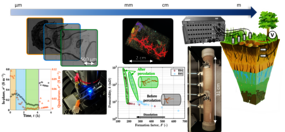Multi-scale geoelectrical characterization of critical zone processes
The critical zone is the near-surface environment that supports most drinking water resources and continental life. The study requires an interdisciplinary approach based on the characterization of the mechanisms involved between air, water, soil, living organisms, and the rock matrix. Geophysical methods enable the monitoring of hydrological and biogeochemical processes in a non-intrusive and low-cost manner. Among the existing techniques, geoelectric methods have proven their ability to monitor water-rock interactions. However, their interpretation is challenging, since it is based on the superposition of several phenomena whose source mechanisms intervene at small scales (e.g., surface charge, fluid-fluid or fluid-mineral interfaces, pore-clogging). In this talk, I will show how electrical monitoring in the laboratory and the development of petrophysical models can improve the understanding of the measured signal and the quantification of the processes. First on column and core samples, then at the micrometric scale with the development of geoelectrical monitoring on microfluidic chips with real-time monitoring by high-speed microscopy. The different scale jumps give a better understanding of the geoelectrical signatures of the critical zone processes, to improve their interpretation at the field scale.

